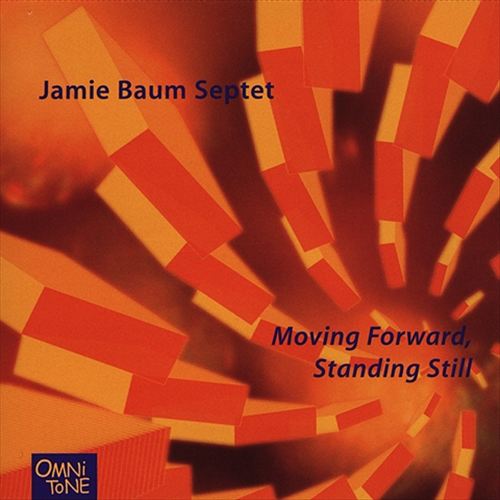
Purchase: Amazon
— Marc Meyers, All About Jazz
“★★★★ Baum’s composing and arranging skills shine forth on Moving Forward, Standing Still. Within these jazz frameworks there’s an uncanny aggregation of looseness and perfection.”
— Glenn Astarita, DownBeat
“Moving Forward, Standing Still is a gem… this is a jazz recording that exemplifies first-rate jazz improvisations and mature, stylistic interpretation. I find the writing and performance to be of the same high integrity as that of Jim McNeely, Kenny Werner and Maria Schneider. Baum’s improvisations floored me. Her solo work on flute is of the highest caliber in the idiom. I am now a big fan.”
— Bob Lark, Flute Talk Magazine
“A huge step forward from her already impressive 1997 recording, Baum’s third album as a leader is simply outstanding. That sense of musical freedom, an unwillingness to limit herself to simply to staid through-composed pieces, post-bop jazz classicism, or free improv experimentalism, but to mix and match the elements that suit her needs on a piece-by-piece basis, is what sets Baum apart from many of her peers, and what makes Moving Forward, Standing Still an immensely satisfying, exciting listen.”
— Stewart Mason, All Music Guide
”A respected jazz musician, one with a couple of well-received CDs under her belt… on Moving Forward, Standing Still she’s assembled a crack team of others like her — leaders of their own bands, much-in-demand sidemen, and skilled improvisers… all the music is very much her own. It’s accessible without being insipid, pretty yet intellectually engaging, and strikes a fine, deliberate balance in giving soloists ample freedom without permitting them to abuse it.”
— Bill Beuttler, Boston Globe
- All Roads Lead To You
- Spring Rounds
- In The Journey
- Clarity
- Medley: From Scratch/Primordial Prelude (Jamie Baum/Trilok Gurtu)
- South Rim
- Central Park
- Bar Talk
- Spring
- Rivington Street Blues
All compositions by Jamie Baum, Lynnjam Music (BMI), except where noted.
Recorded on 29-30 May 2002 at Horizon Sound in Pitman, New Jersey
Jamie Baum Septet
Jamie Baum, flute, alto flute
Ralph Alessi, trumpet, flügelhorn
Doug Yates, alto saxophone, bass clarinet
Tom Varner, French horn
George Colligan, piano, electric piano
Drew Gress, bass
Jeff Hirshfield, drums
Yosuke Yamamoto, percussion (on #5 & #7)
Recorded, mixed, and edited by Paul Wickliff
Album Designer: Frau Kranift
Band photo by Fedner La Chapelle
Liner notes and artist photos by Frank Tafuri
Producers: Jamie Baum & Richard DeRosa
Executive Producer: Frank Tafuri
OmniTone 15206
The you in “All Roads Lead to You” is Igor Stravinsky, one of several contemporary classical composers who’ve influenced the music on Moving Forward. There are multiple overlapping and dovetailing lines, meters, timbres, tempos, and energies inspired by the piece she rediscovered while working on her graduate degree at the Manhattan School of Music.
The piece contains also, by the way, one motif Jamie reworked from the Rite of Spring, and a phrase later in the piece apparently quoted from John Coltrane’s “Naima” was purely coincidental, a factor of how great music creeps into the collective musical conscious (and unconscious).
Phrases from one of Bela Bartók’s string quartets are quoted in (yes, you guessed it) “Bar Talk,” and Stavinsky’s Rite remerges in “Spring,” the first piece Jamie wrote for the Septet, a configuration she settled on artistically for its flexibility of size, the openness of its uncommon instrumentation, and the challenge of making a small group sound big. From a practical standpoint, she chose septet because it is large enough to give her a variety of voices to work with without being as big of a “money pit” as a larger ensemble. Adds Jamie, “I couldn’t imagine what a big band would cost.”
Also, as a flutist, she’s spent quite a bit of time over the years in smaller chamber-type ensembles playing classical music, new music, Brazilian music, and Latin music. Originally from Connecticut, now living in New York City, Jamie works performing, composing, recording, and holding clinics. She has toured extensively in the US, Europe, Japan, South America and South Asia, performing at festivals, clubs, and concert halls with her own ensembles and well as with luminaries ranging from Kenny Werner, Tom Harrell, Fred Hersch, and Randy Brecker to Dave Douglas, Paul Motian, and George Russell.
A winner of several Down Beat Critics’ and Readers’ Polls and a recipient of several grants and awards, Jamie has participated in US State Department/Kennedy Center Jazz Ambassador Program, touring extensively in South America, India, and South Asia. She’s active both as a private teacher at home and at the New School and as a clinician nationally and internationally.
Jamie received a Bachelor of Music degree from The New England Conservatory and a Master’s Degree from the Manhattan School of Music in jazz composition. She studied flute with Ransom Wilson, Robert Stallman, Hubert Laws and Keith Underwood; jazz improvisation with Richie Bierach, Dave Liebman, Jaki Byard, and Charlie Banacos and composition with Richard DeRosa, WT McKinnley, and Ludmilla Ulehla.
With such a wide and thorough training as an instrumentalist, improviser, and composer, it’s not surprising that influences of the various musics she’s played and of various 20th century classical composers became a sort of theme for Moving Forward.
Many pieces are conceptually as well as literally inspired. For example, an actual walk through the park inspired Jamie to base “Central Park” on the concept behind Charles Ives’ orchestral piece “Central Park in the Dark,” an atmospheric depiction of the varied and overlapping sounds one hears while taking a stroll through the New York landmark.
